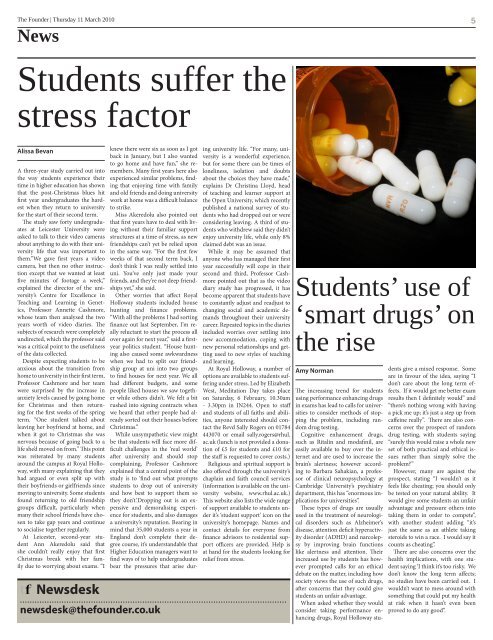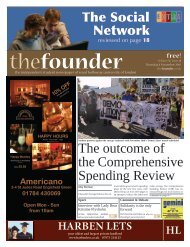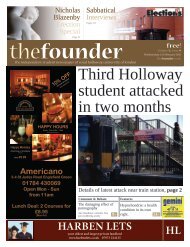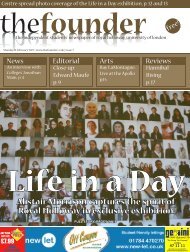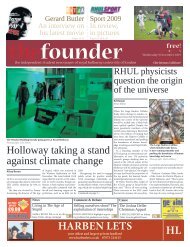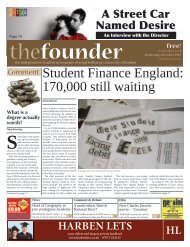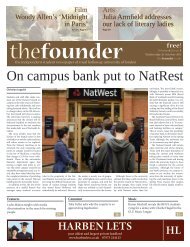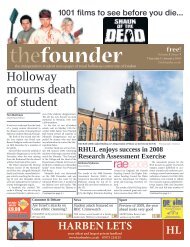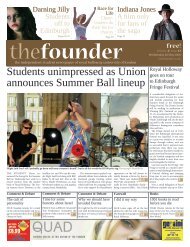HARBEN LETS HL Fashion Show Preview - The Founder
HARBEN LETS HL Fashion Show Preview - The Founder
HARBEN LETS HL Fashion Show Preview - The Founder
You also want an ePaper? Increase the reach of your titles
YUMPU automatically turns print PDFs into web optimized ePapers that Google loves.
<strong>The</strong> <strong>Founder</strong> | Thursday 11 March 2010<br />
News<br />
Students suffer the<br />
stress factor<br />
Alissa Bevan<br />
A three-year study carried out into<br />
the way students experience their<br />
time in higher education has shown<br />
that the post-Christmas blues hit<br />
first year undergraduates the hardest<br />
when they return to university<br />
for the start of their second term.<br />
<strong>The</strong> study saw forty undergraduates<br />
at Leicester University were<br />
asked to talk to their video cameras<br />
about anything to do with their university<br />
life that was important to<br />
them.”We gave first years a video<br />
camera, but then no other instruction<br />
except that we wanted at least<br />
five minutes of footage a week,”<br />
explained the director of the university’s<br />
Centre for Excellence in<br />
Teaching and Learning in Genetics,<br />
Professor Annette Cashmore,<br />
whose team then analysed the two<br />
years worth of video diaries. <strong>The</strong><br />
subjects of research were completely<br />
undirected, which the professor said<br />
was a critical point to the usefulness<br />
of the data collected.<br />
Despite expecting students to be<br />
anxious about the transition from<br />
home to university in their first term,<br />
Professor Cashmore and her team<br />
were surprised by the increase in<br />
anxiety levels caused by going home<br />
for Christmas and then returning<br />
for the first weeks of the spring<br />
term. “One student talked about<br />
leaving her boyfriend at home, and<br />
when it got to Christmas she was<br />
nervous because of going back to a<br />
life she’d moved on from.” This point<br />
was reiterated by many students<br />
around the campus at Royal Holloway,<br />
with many explaining that they<br />
had argued or even split up with<br />
their boyfriends or girlfriends since<br />
moving to university. Some students<br />
found returning to old friendship<br />
groups difficult, particularly when<br />
many their school friends have chosen<br />
to take gap years and continue<br />
to socialise together regularly.<br />
At Leicester, second-year student<br />
Ann Akeredolu said that<br />
she couldn’t really enjoy that first<br />
Christmas break with her family<br />
due to worrying about exams. “I<br />
tf Newsdesk<br />
knew there were six as soon as I got<br />
back in January, but I also wanted<br />
to go home and have fun,” she remembers.<br />
Many first years here also<br />
experienced similar problems, finding<br />
that enjoying time with family<br />
and old friends and doing university<br />
work at home was a difficult balance<br />
to strike.<br />
Miss Akeredolu also pointed out<br />
that first years have to deal with living<br />
without their familiar support<br />
structures at a time of stress, as new<br />
friendships can’t yet be relied upon<br />
in the same way. “For the first few<br />
weeks of that second term back, I<br />
don’t think I was really settled into<br />
uni. You’ve only just made your<br />
friends, and they’re not deep friendships<br />
yet,” she said.<br />
Other worries that affect Royal<br />
Holloway students included house<br />
hunting and finance problems.<br />
“With all the problems I had sorting<br />
finance out last September, I’m really<br />
reluctant to start the process all<br />
over again for next year,” said a firstyear<br />
politics student. “House hunting<br />
also caused some awkwardness<br />
when we had to split our friendship<br />
group at uni into two groups<br />
to find houses for next year. We all<br />
had different budgets, and some<br />
people liked houses we saw together<br />
while others didn’t. We felt a bit<br />
rushed into signing contracts when<br />
we heard that other people had already<br />
sorted out their houses before<br />
Christmas.”<br />
While unsympathetic view might<br />
be that students will face more difficult<br />
challenges in the ‘real world’<br />
after university and should stop<br />
complaining, Professor Cashmore<br />
explained that a central point of the<br />
study is to ‘find out what prompts<br />
students to drop out of university<br />
and how best to support them so<br />
they don’t.’Dropping out is an expensive<br />
and demoralising experience<br />
for students, and also damages<br />
a university’s reputation. Bearing in<br />
mind that 35,000 students a year in<br />
England don’t complete their degree<br />
course, it’s understandable that<br />
Higher Education managers want to<br />
find ways of to help undergraduates<br />
bear the pressures that arise dur-<br />
newsdesk@thefounder.co.uk<br />
ing university life. “For many, university<br />
is a wonderful experience,<br />
but for some there can be times of<br />
loneliness, isolation and doubts<br />
about the choices they have made,”<br />
explains Dr Christina Lloyd, head<br />
of teaching and learner support at<br />
the Open University, which recently<br />
published a national survey of students<br />
who had dropped out or were<br />
considering leaving. A third of students<br />
who withdrew said they didn’t<br />
enjoy university life, while only 8%<br />
claimed debt was an issue.<br />
While it may be assumed that<br />
anyone who has managed their first<br />
year successfully will cope in their<br />
second and third, Professor Cashmore<br />
pointed out that as the video<br />
diary study has progressed, it has<br />
become apparent that students have<br />
to constantly adjust and readjust to<br />
changing social and academic demands<br />
throughout their university<br />
career. Repeated topics in the diaries<br />
included worries over settling into<br />
new accommodation, coping with<br />
new personal relationships and getting<br />
used to new styles of teaching<br />
and learning.<br />
At Royal Holloway, a number of<br />
options are available to students suffering<br />
under stress. Led by Elizabeth<br />
West, Meditation Day takes place<br />
on Saturday, 6 February, 10.30am<br />
- 3.30pm in IN244. Open to staff<br />
and students of all faiths and abilities,<br />
anyone interested should contact<br />
the Revd Sally Rogers on 01784<br />
443070 or email sally.rogers@rhul.<br />
ac.uk (lunch is not provided a donation<br />
of £5 for students and £10 for<br />
the staff is requested to cover costs.)<br />
Religious and spiritual support is<br />
also offered through the university’s<br />
chaplain and faith council services<br />
(information is available on the university<br />
website, www.rhul.ac.uk.)<br />
This website also lists the wide range<br />
of support available to students under<br />
it’s ‘student support’ icon on the<br />
university’s homepage. Names and<br />
contact details for everyone from<br />
finance advisors to residential support<br />
officers are provided. Help is<br />
at hand for the students looking for<br />
relief from stress.<br />
Students’ use of<br />
‘smart drugs’ on<br />
the rise<br />
Amy Norman<br />
<strong>The</strong> increasing trend for students<br />
using performance enhancing drugs<br />
in exams has lead to calls for universities<br />
to consider methods of stopping<br />
the problem, including random<br />
drug testing.<br />
Cognitive enhancement drugs,<br />
such as Ritalin and modafinil, are<br />
easily available to buy over the internet<br />
and are used to increase the<br />
brain’s alertness; however according<br />
to Barbara Sahakian, a professor<br />
of clinical neuropsychology at<br />
Cambridge University’s psychiatry<br />
department, this has “enormous implications<br />
for universities”.<br />
<strong>The</strong>se types of drugs are usually<br />
used in the treatment of neurological<br />
disorders such as Alzheimer’s<br />
disease, attention deficit hyperactivity<br />
disorder (ADHD) and narcolepsy<br />
by improving brain functions<br />
like alertness and attention. <strong>The</strong>ir<br />
increased use by students has however<br />
prompted calls for an ethical<br />
debate on the matter, including how<br />
society views the use of such drugs,<br />
after concerns that they could give<br />
students an unfair advantage.<br />
When asked whether they would<br />
consider taking performance enhancing<br />
drugs, Royal Holloway stu-<br />
5<br />
dents give a mixed response. Some<br />
are in favour of the idea, saying “I<br />
don’t care about the long term effects.<br />
If it would get me better exam<br />
results then I definitely would” and<br />
“there’s nothing wrong with having<br />
a pick me up; it’s just a step up from<br />
caffeine really”. <strong>The</strong>re are also concerns<br />
over the prospect of random<br />
drug testing, with students saying<br />
“surely this would raise a whole new<br />
set of both practical and ethical issues<br />
rather than simply solve the<br />
problem?”<br />
However, many are against the<br />
prospect, stating “I wouldn’t as it<br />
feels like cheating; you should only<br />
be tested on your natural ability. It<br />
would give some students an unfair<br />
advantage and pressure others into<br />
taking them in order to compete”,<br />
with another student adding “it’s<br />
just the same as an athlete taking<br />
steroids to win a race. I would say it<br />
counts as cheating”.<br />
<strong>The</strong>re are also concerns over the<br />
health implications, with one student<br />
saying ‘I think it’s too risky. We<br />
don’t know the long term affects;<br />
no studies have been carried out. I<br />
wouldn’t want to mess around with<br />
something that could put my health<br />
at risk when it hasn’t even been<br />
proved to do any good”.


